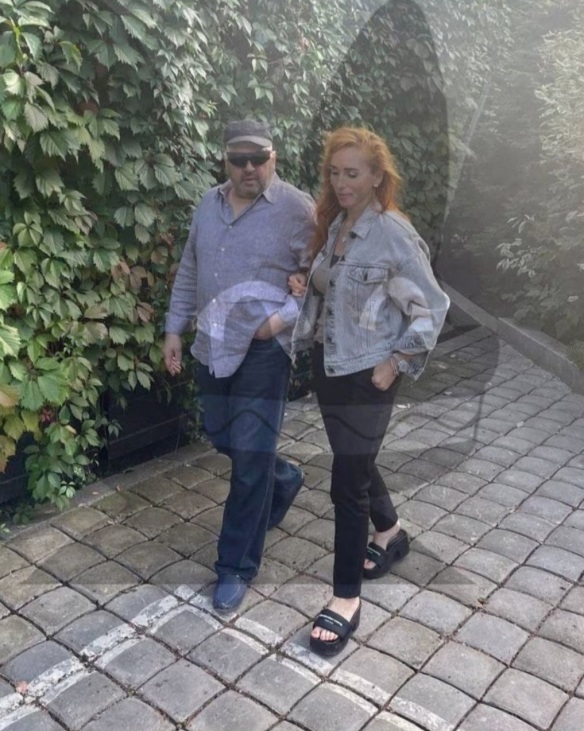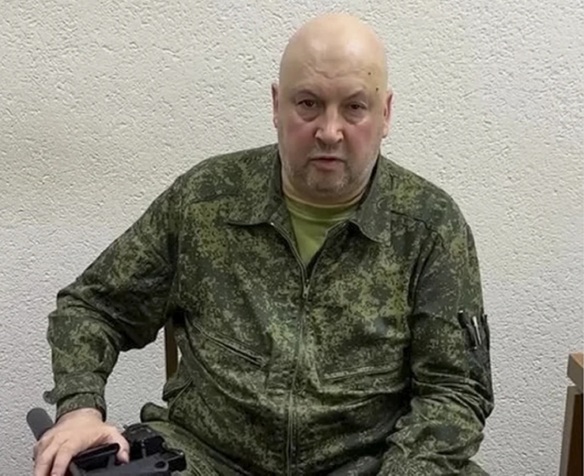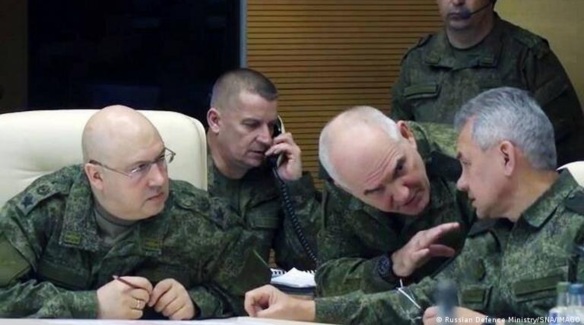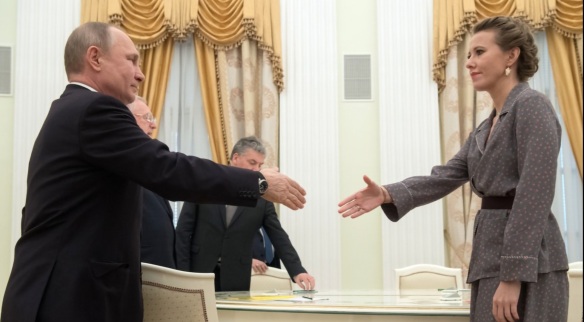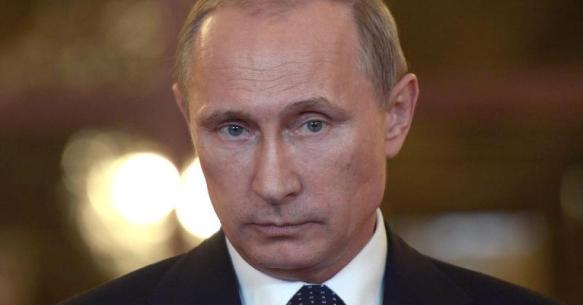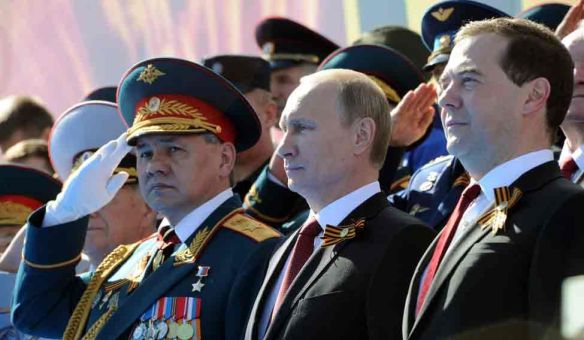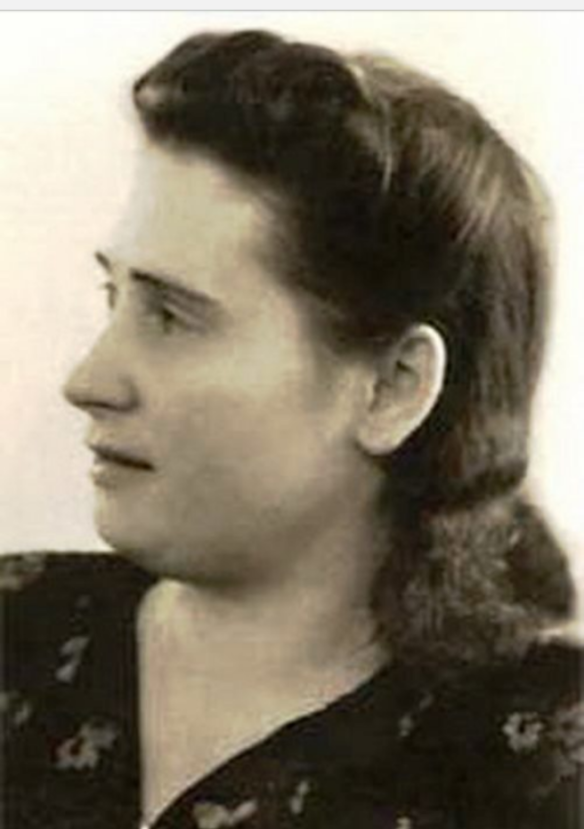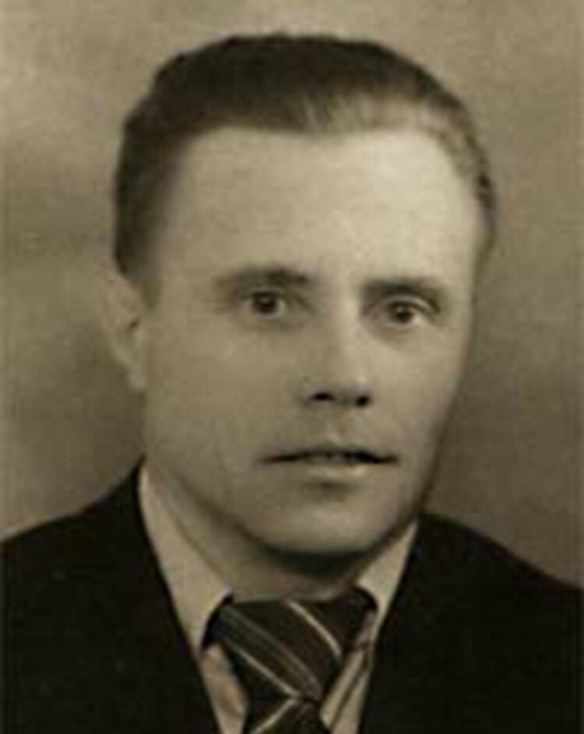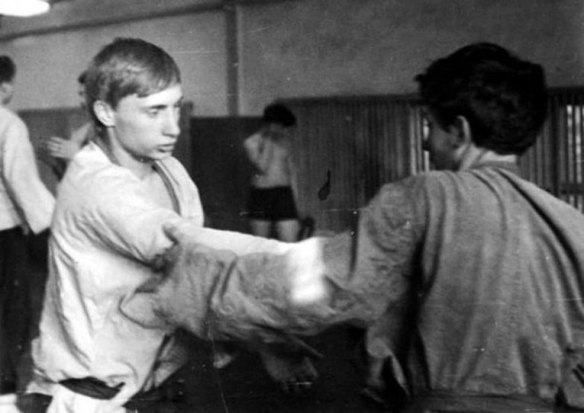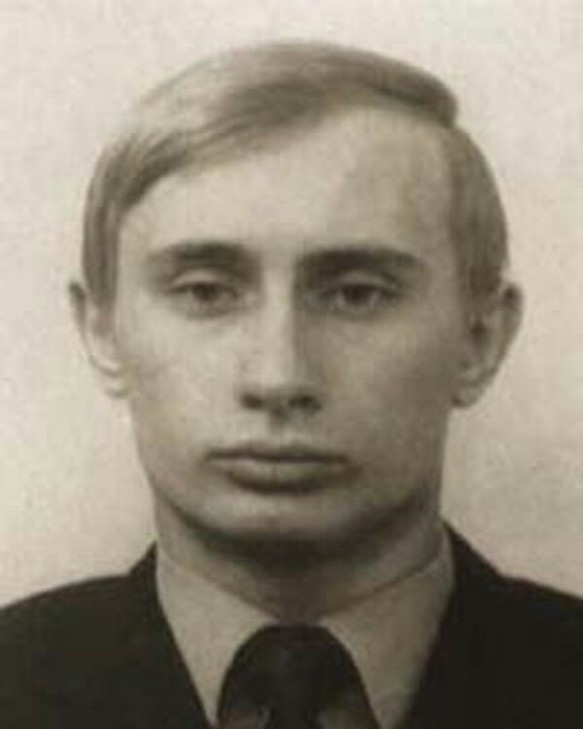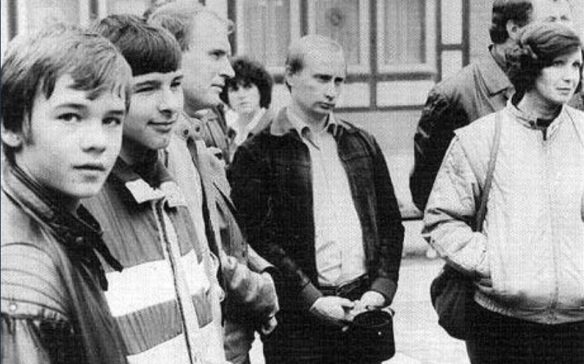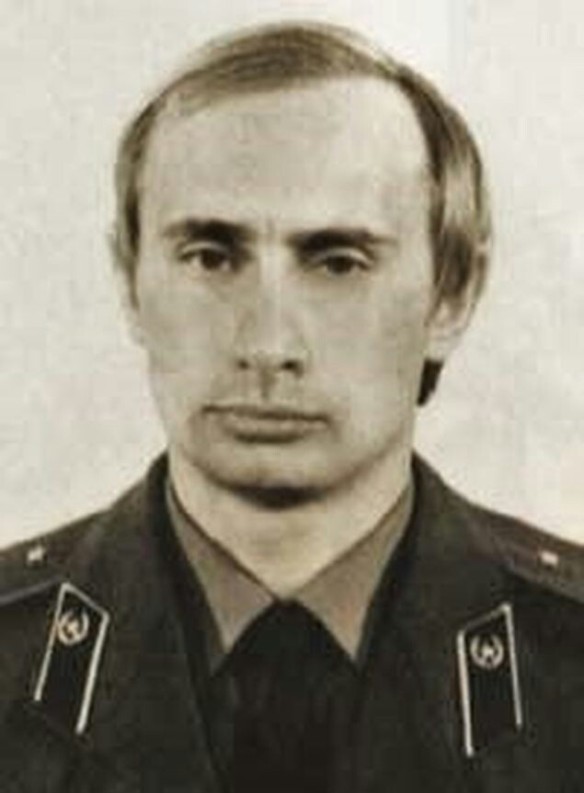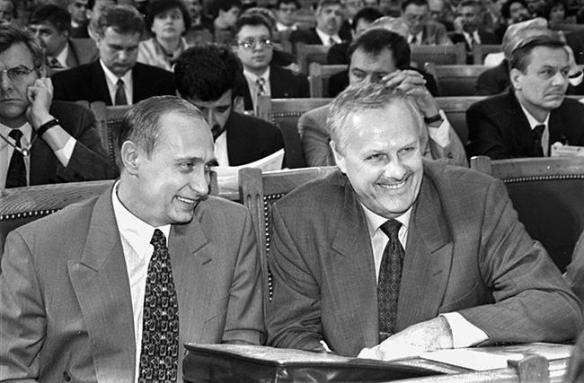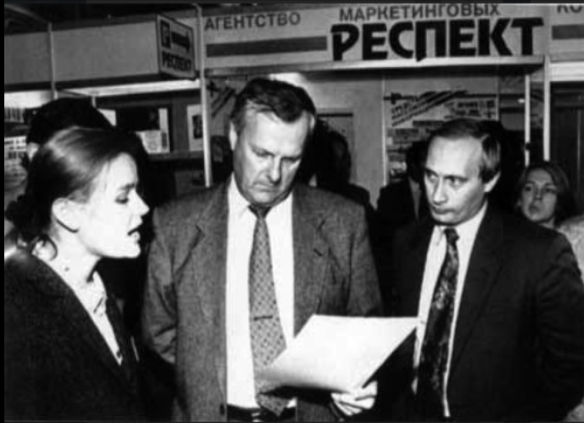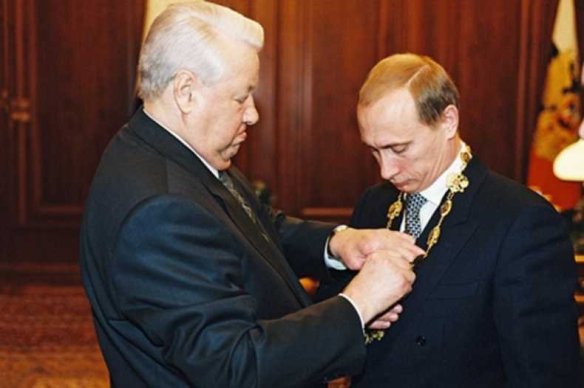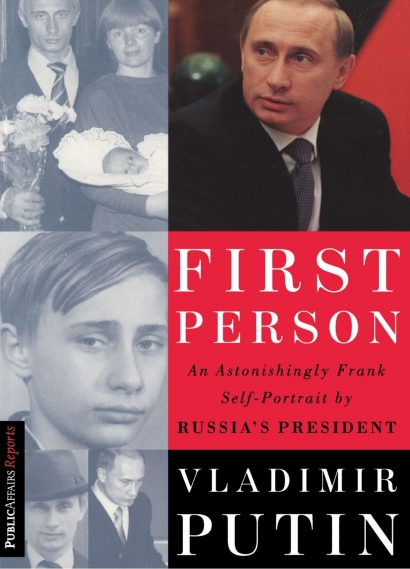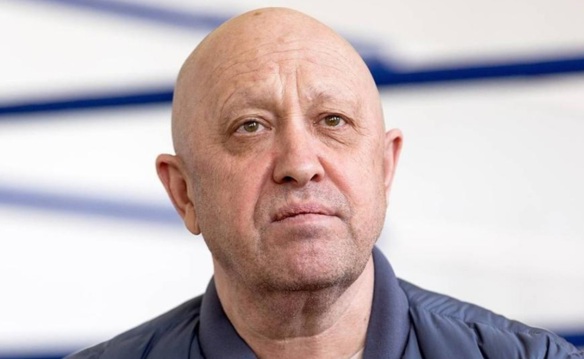
Yevgeny Prigozhin, the individual at the center of the Wagner Group Rebellion (above). The common wisdom concerning the Wagner Group Rebellion is that it represented the biggest threat to Putin in his more than two decades in power, exposing his weakness and eroding the Kremlin’s authority. It was apparently easy to find a simple explanation when considering the facts in their true context would surely lead to a more complex one. Few experts and observers stirred controversy by contesting the conventional wisdom on the matter, For some, it may have been the case that they were uninterested in any other answer. On the matter of the Wagner Group Rebellion, as has been the case with nearly all things Putin, there only needed to be the possibility for their wishes about it to be true for them to rush to judgment. From the start, greatcharlie had sought to stay out of the echo chamber of reports forecasting Putin’s imminent downfall, the downward spiral of the regime, and the end of Prigozhin, and the Wagner Group. It is greatcharlie’s contention that an alternate, somewhat more complex explanation of events is at hand.
On June 23, 2023, the government of the Russian Federation reportedly faced a crisis when what has been described as an armed insurrection was ignited by the private military corporation, ChVK Vagnera, popularly known as Gruppa Vagnera (the Wagner Group). At the center of events was the owner of the Wagner Group, Yevgeny Prigozhin. Although an intriguing figure in his own right, Prigozhin holds a level of standing with Russian Federation President Vladimir Putin which speaks volumes. Prigozhin is widely known in the Russian Federation by the cognomen “Putin’s chef” because of his catering businesses that organized dinners Putin hosted for foreign dignitaries. Prigozhin’s Wagner Group is well-known for its global paramilitary operations, particularly those in African hotspots, under the plausibly deniable auspices of the Russian Federation government. The Wagner Group was first called into action on a large scale in March 2014 during Russia’s annexation of Crimea. Nearly 1,000 members of the Wagner Group were also sent in to support ethnic-Russian separatists in the Donetsk and Luhansk Oblasts (Provinces). However, Prigozhin’s close relationship with Putin and the Russian Federation government was ostensibly put in jeopardy, and, according to Western some newsmedia outlets, has been destroyed, given what greatcharlie will refers to here as the Wagner Group Rebellion. Some might suggest that problems really began when Prigozhin was asked to move greater numbers of Wagner Group troops into Ukraine once the Russian Federation’s Spetsial’noy Voyennoy Operatsii (Special Military Operation) was launched, he complied, but right away the situation went awry.
Strategically, tactically and operationally, the special military operation was a disaster. Russian Federation commanders rarely displayed military acumen on the battlefield. Russian Federation troops and contractors as the Wagner Group regularly lacked sufficient supplies of critical gear and ammunition. The most troubling aspect was the wasteful expenditure of Russian Federation troops and contractors, but especially the lives of Wagner Group troops without accomplishing anything substantial. With graduated intensity, Prigozhin made his disappointments known publicly and exposed much of what was going wrong for the Russian Federation in Ukraine. However, there was little change or it was at best glacial. The Russian Federation Armed Forces desperately needs the help of the Wagner Group in Ukraine, but Prigozhin has had a belly full of the delinquencies, deficiencies, and ineptitude of the Russian Federation military leadership which his organization has been directed to work under. By 2023, Prigozhin unquestionably behaved as if he were frenzied, and perhaps justifiably and reasonably so, with the great injustice put upon Wagner Group troops in Ukraine as well as the troops of the Russian Federation Armed Forces.
However on June 23, 2023, Prigohzin shifted from simply accusing Ministr Oborony Rossijskoj Federacii (Minister of Defense of the Russian Federation) Russian Army General Sergei Shoigu and Chief of General’nyy shtab Vooruzhonnykh sil Rossiyskoy Federatsii (General Staff of the Armed Forces of the Russian Federation), Russian Army General Valery Gerasimov of poorly conducting the then 16th month long special military operation when events took a graver turn. Prigozhin accused forces under the direction of Shoigu and Gerasimov of attacking Wagner Group camps in Ukraine with rockets, helicopter gunships and artillery and as he stated killing “a huge number of our comrades.” The Russian Federation Defense Ministry denied attacking the camps. In an act of daylight madness, Prigozhin then drove elements of the Wagner Group into the Russian Federation from Ukraine with the purpose of removing Shoigu and Gerasimov from their posts by force. His Wagner Group troops advanced to just 120 miles (200 kilometers) from Moscow. However a deal brokered by Belarus President Alexander Lukashenko was struck for the Wagner Group to halt. Prigozhin withdrew his forces to avoid “shedding Russian blood.”
The common wisdom concerning the Wagner Group Rebellion is that it represented the biggest threat to Putin in his more than two decades in power, exposing his weakness and eroding the Kremlin’s authority. It was apparently easy to find a simple explanation when considering the facts in their true context would surely lead to a more complex one. Few experts and observers stirred controversy by contesting the conventional wisdom on the matter, For some, it may have been the case that they were uninterested in any other answer. On the matter of the Wagner Group Rebellion, as has been the case with nearly all things Putin, there only needed to be the possibility for their wishes about it to be true for them to rush to judgment. In reality the picture drawn indicating the Wagner Group’s action was designed to bring down Putin’s regime is circumstantial and thereby enough to be convincing for many. Without pretension, greatcharlie confesses that it is burdened by an inquisitive mind. From the start, it had sought to stay out of the echo chamber of reports forecasting Putin’s imminent downfall, the downward spiral of the regime, and the end of Prigozhin,and the Wagner Group. It is greatcharlie’s contention that an alternate, somewhat more complex explanation of events is at hand. In this two part discussion, the suppositions presented are not founded on wild speculation on what may have transpired but rather conclusions reached on the basis of evidence and reasoning. If greatcharlie might be allowed the liberty, it freely admits that it would hardly know with a high degree of certainty what the thinking among Putin and his advisers was before the Wagner Group Rebellion. If modesty permits, greatcharlie believes it possesses some instinct for deciphering the thinking and actions of the Kremlin on foreign and national security policy matters. At the same time it fully recognizes that one’s instinct for such given all of the nuances can occasionally play one false.
Once it reached certain suppositions, greatcharlie freely admits delayed publishing this essay for although it was confident of its findings, events were moving so fast concerning the Wagner Group Rebellion that it believed aspects of this case would likely arise that it could hardly have anticipated. (Perhaps it is a singular comfort that can best be enjoyed by those editing small, independent blogs.) The decision was then made to publish even though events were still being played out with the aim of sharing its learning process and insights with readers, especially students with the hope to evoke a desire within them to consider with reason possibilities and ignite the development of their insights on what is known and ruminate upon potentialities from what is unknown. If greatcharlie might hope have any appeal to the community of foreign and national security policy analysts, in recent times it would be satisfied to merely be a stimulus to the policy debate of the Ukraine War.Omnia non properanti clara certaque erunt; festinatio improvida est, et cæca. (All things will be clear and distinct to the man who does not hurry; haste is blind and improvident.)
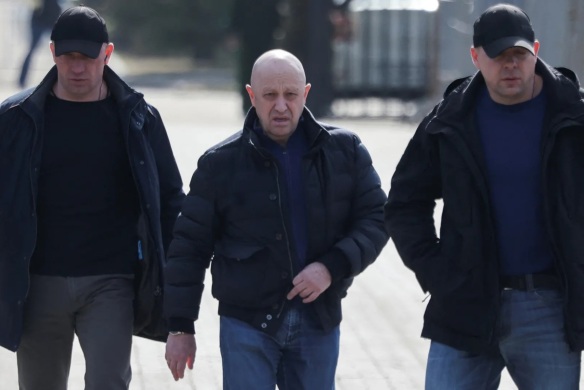
Prigozhin arrives with guards at funeral ceremony held in the Troyekurovskoye cemetery in Moscow, Russia, April 8, 2023. In this post, greatcharlie chronicles Prigozhin’s story–sine ira et studio–by assembling elements of various reports in a way that provides its readers with a bit of extra nuance which may appropriately give certain aspects of his past higher meaning. A few new ideas and insights are offered on his more recent statements and actions. Greater meaning is given to facts that are generally known. It is an effort to feel where Prigozhin is in his life, and understand not only what he has been doing but why. This is not intended to be some definitive examination of Prigozhin. However, it may assist many of greatcharlie’s readers in developing their own insights on the complex individual that is Prigozhin.
About Prigozhin
Since Prigozhin, as aforementioned, is at the center of all that has transpired, it seems appropriate to provide some background on the individual who allegedly took on Putin. An account of Prigozhin’s life has been widely circulated in the international newsmedia. Those biographies usually discuss certain elements of his life, typically offering a fragmented picture of Prigozhin story: other than average beginnings; potential as skier lost; imprisonment; release, family support and entry into food service industry; support from friends; entry into restaurant and gambling businesses; elite contacts and growth; Putin ties; catering and opportunities of a lifetime; and, business diversification to include internet business and the Wagner Group. Prigozhin’s story–sine ira et studio–by assembling elements of various reports in a way that provides its readers with a bit of extra nuance which may appropriately give certain aspects of his past higher meaning. A few new ideas and insights are offered on his more recent statements and actions. Greater meaning is given to facts that are generally known. It is an effort to feel where Prigozhin is in his life, and understand not only what he has been doing but why. This is not intended to be some definitive examination of Prigozhin. However, it may assist many of greatcharlie’s readers in developing their own insights on the complex individual that is Prigozhin.
Yevgeny Viktorovich Prigozhin’s life had the least promising commencement. He was born on June 1, 1961 in Leningrad (now Saint Petersburg) in the Soviet Union, the son of a nurse, Violetta Prigozhina, and a mining engineer, Viktor Prigozhin. His father died when Prigozhin was a 9-year-old, leaving his mother to support him and his sick grandmother by working at a local hospital. During his school years, Prigozhin aspired to be a professional cross-country skier. He was trained by his stepfather Samuil Zharkoy, who was an instructor in the sport, and attended a prestigious athletics boarding school from which he graduated in 1977. However, due to an injury, he left the sport. Unfortunately, the criminal culture of St Petersburg drew him in.
There is an old saying directed at youth which greatcharlie paraphrases: “If one is around the wrong kind of people one will likely get involved with the wrong kind of things.” In November 1979, 18-year-old Prigozhin was caught stealing and given a suspended sentence. However, later in 1981, he and several accomplices, according to Meduza, were arrested for robbing apartments in upscale neighborhoods. He would be convicted on four charges to include robbery, fraud, and involving teenagers in prostitution. Id nobis maxime nocet, quod non ad rationis lumen sed ad similitudinem aliorum vivimus. (Is especially ruinous to us, that we shape our lives not by the light of reason, but after the fashion of others.)
In a five-page biography attached to an October 2021 email acquired by the Intercept from Capital Legal Services that appears to have been drafted by his attorneys, it was revealed that Prigozhin violated the terms of his confinement “on a regular basis” until 1985, when in solitary confinement, he started to “read intensely.” In 1988, the Russian Supreme Court reduced his sentence to 10 years, noting that he had “began corrective behavior.” In order to earn money, he requested to be transferred to a residential colony for timber work, which the document characterizes as “extremely hard labor.” After serving 9 years of his 13 year sentence, Prigozhin was freed in 1990. Immediately after his release, Prigozhin briefly returned to skiing, by working as a ski trainer at an athletics school in Leningrad, according to Novaya Gazeta, a Russian newspaper known for its critical coverage of the Kremlin. The newspaper also reported that Prigozhin in 1990 studied at the Leningrad Chemical and Pharmaceutical Institute–now the Saint Petersburg State Chemical Pharmaceutical Academy–but was expelled.
Food Service
Prigozhin would next move in a completely different direction which placed his life on an amazing trajectory. He set up a hot-dog stand in Leningrad with his mother and stepfather in the Aprashaka Flea Market. Prigozhin was essentially a street vendor, without much in the way of formal food service training or food service management. Yet, he clearly possessed a considerable knack for preparing and selling food to people. He apparently knew what they liked and knew what was right. He was quoted in an interview with the New York Times as stating: The rubles were piling up faster than his mother could count them.” After the collapse of the Soviet Union, Prigozhin followed the entrepreneurial spirit of the times and founded or became involved in many new businesses. Isthuc est sapere non quod ante pedes modo est videre, sed etiam illa quæ futura sunt prospicere. (True wisdom consists not in seeing that which is immediately before our eyes, but in the foresight of that which may happen.)
From 1991 to 1997, Prigozhin became heavily involved in the grocery store business. Eventually, he managed to become a 15 percent stakeholder and manager of Contrast, which was the first grocery store chain in St. Petersburg and founded by his former classmate Boris Spektor. In the 1990s, Prigozhin opened a fast-food cafe, which was followed by a series of food marts in the city. In 1995, when revenues of his other businesses began to fall, Prigozhin persuaded a director at Contrast, Kiril Ziminov, to open a restaurant with him. They opened their first restaurant in 1996, Staraya Tamozhnya (Old Customs House) on St Petersburg’s Vasilievsky Island.
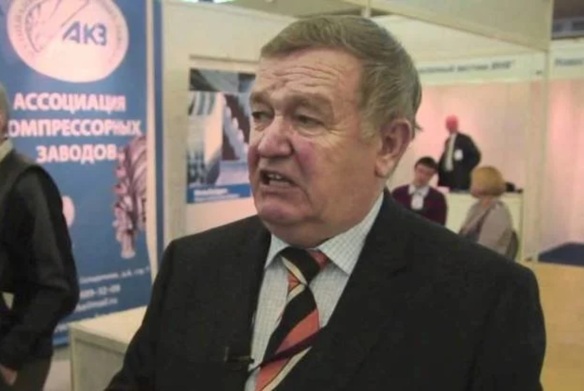
Boris Spektor (above). From 1991 to 1997, Prigozhin became heavily involved in the grocery store business. Eventually, he managed to become a 15 percent stakeholder and manager of Contrast, which was the first grocery store chain in St. Petersburg and founded by his former classmate Boris Spektor. In the 1990s, Prigozhin opened a fast-food cafe, which was followed by a series of food marts in the city. In 1995, when revenues of his other businesses began to fall, Prigozhin persuaded a director at Contrast, Kiril Ziminov, to open a restaurant with him. They opened their first restaurant in 1996, Staraya Tamozhnya (Old Customs House) on St Petersburg’s Vasilievsky Island. During those same heady years, Prigozhin entered the gambling business. Spektor along with another hard charging entrepreneur, Igor Gorbenko, brought Prigozhin on as CEO of Spektr (Spectrum) CJSC which established the first casinos in St Petersburg. The trio would jointly start many other enterprises in diverse industries in the 1990s, including construction, marketing research, and import-export.
According to the Guardian, Prigozhin found Tony Gear, a British hotel administrator who had previously worked at the Savoy in London and was now at one of St Petersburg’s few luxury hotels. He employed Gear to manage first a wine shop, then the Old Customs House. Initially, the Old Customs House employed strippers as a way to drum up clientele, but oddly enough the restaurant’s food became the real draw for patrons and stripper operations were suspended. Gear marketed the Old Customs House as the most refined place to eat in a city that was only just discovering fine dining.
On its website, the Old Customs House is described on its website as one of the oldest restaurants in the city. Pop stars and businessmen liked to eat there, as did St Petersburg’s mayor, Anatoly Sobchak, who sometimes came with his deputy, Putin. Photographs of Prigozhin in his exclusive St. Petersburg restaurants typically depict him serving the elite of the Russian Federation and standing-by dutifully in the background, ready to respond to his very important patrons’ every need. Prigozhin does not display a scintilla of shyness now, and he was hardly shy during those early years of his restaurant ventures. One might imagine that Prigozhin had a gift for repartee which was most likely greatly appreciated by patrons.
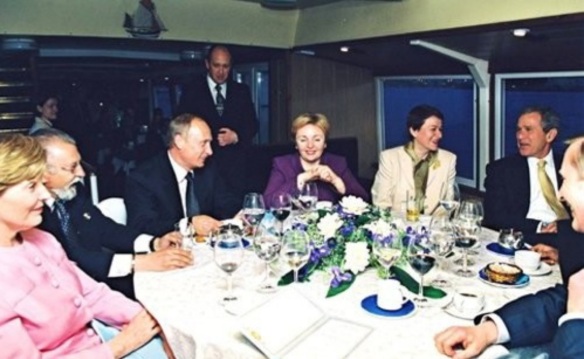
Russian Federation President Vladimir Putin and US President George W. Bush with their spouses on board the New Island Restaurant. Prigozhin is standing by dutifully, back and to the left of Putin. Putin’s generosity toward Prigozhin began in full-bore in 2000, when the newly minted Russian Federation President, brought the then-Prime Minister of Japan, Yoshiro Mori, to a professional dinner at New Island out of sheer interest. The following year, Putin brought Jacques Chirac, then former President of France, to Prigozhin’s “buoyant” restaurant. He brought US President George W. Bush to the New Island in 2002. Prigozhin personally served food to Putin’s foreign guests. Imaginably, all of his guests left the New Island with appetites “keener” for Russian cuisine afterwards. Putin hosted his own birthday party at the New Island in 2003. Prigozhin assistance was clearly an integral part of whatever plan Putin had for foreign dignitaries. To that extent, Prigozhin was integral to Putin’s approach to handling foreign and national security policy issues with his visitors. The degree of Prigozhin’s connection with Putin was undeniable, frightfully apparent. Putin would go on to make use of Prigozhin’s assistance on many matters of the utmost importance to the Russian Federation and utmost importance to him. If greatcharlie is correct, he continues to do so today
During those same heady years, Prigozhin entered the gambling business. Spektor along with another hard charging entrepreneur, Igor Gorbenko, brought Prigozhin on as CEO of Spektr (Spectrum) CJSC which established the first casinos in St Petersburg. The trio would jointly start many other enterprises in diverse industries in the 1990s, including construction, marketing research, and import-export. Through his joint ownership of the gambling businesses, it has been suggested by Novaya Gazeta that Prigozhin may have first encountered Putin or at least began interacting with him on a professional level. Putin at the time had been chairman of the supervisory board for casinos and gambling since 1991. What started as a business acquaintance became a good friendship. Putin was reportedly intrigued by what could be characterized as Prigozhin’s rags-to-riches story.
In 1997, Prigozhin and Ziminov, founded a second restaurant, New Island, a floating eatery that became one of the most fashionable dining spots in the city. Inspired by waterfront restaurants on the River Seine in Paris, the two created the restaurant by spending $400,000 to remodel a rusting ferry boat on the Vyatka River. Prigozhin told the magazine Elite Society in 2008 that the new restaurant offered Russians something new and different from boring “cutlets with vodka.”
It was no mean feat to create a profitable restaurant in St. Petersburg with a potential clientele that represented a small percentage of the population and managed to get them through the doors every night, let alone open a second based on a concept alien to a good portion of that exclusive clientele. In 1998, he opened the New Island Restaurant on a boat, which one tourism website calls “St. Petersburg’s only floating luxury Restaurant-Ship.” The New Island Restaurant also became a favorite of Putin, who by then was the former deputy mayor of the city.
In Part 7, of his biography/memoir First Person: An Astonishingly Frank Self-Portrait by Russia’s President (Public Affairs, 2000), Putin explains that once his superior and political mentor, the Mayor of Leningrad Alexander Sobchak, lost his re-elect bid, he faced a lean and trying period as the erstwhile deputy mayor of the city. He was unemployed for a few months and sufficient money was not coming into the household. His mother was also in the picture. Putin was greatly concerned for his future. He was making calls, wearing out shoe leather, and knocking on all doors with the hope of securing something appropriate. As the story goes, Putin’s luck changed immensely. Putin would still visit Prigozhin’s popular St. Petersburg restaurant. That allowed Putin to keep in the mix of things, hobnobbing with elites. The gregarious Prigozhin most likely would have insisted that Putin dine “on the house”. Prigozhin was very likely a friend indeed at a time of need for Putin. If what has been surmised here truly was the case, it would do much to explain in good part why Putin was considerably generous toward Prigozhin in later years. (In its March 31, 2017 post entitled, “Book Review: Vladimir Putin, First Person: An Astonishingly Frank Self-Portrait by Russia’s President (Public Affairs, 2000)”, greatcharlie provides a review of Putin’s memoir/biography.)
Putin’s generosity toward Prigozhin began in full-bore in 2000, when the newly minted Russian Federation President, brought the then-Prime Minister of Japan, Yoshiro Mori, to a professional dinner at New Island out of sheer interest. The following year, Putin brought Jacques Chirac, then former President of France, to Prigozhin’s “buoyant” restaurant. He brought US President George W. Bush to the New Island in 2002. Prigozhin personally served food to Putin’s foreign guests. Imaginably, all of his guests left the New Island with appetites “keener” for Russian cuisine afterwards. Putin hosted his own birthday party at the New Island in 2003.
Putin clearly displayed liking for Prigozhin before everyone. Meduza reported Putin welcomed him as “one of the boys.” To clarify, Prigozhin was neither Chekisty, the son or grandson of a member of the Soviet Union’s Narodnyi Komissariat Vnutrennikh Del (People’s Commissariat of Internal Affairs) or NKVD, an iteration of the security services during World War II, as Putin is, nor was he Siloviki, someone who had served in the Soviet Union’s Komitet Gosudarstvennoy Bezopasnosti (the Committee for State Security) or KGB as Putin and most of his close associates had. Current Russian Federation Vice President Dmitry Medvedev, who was an attorney in St.Petersburg when Putin met him, also falls into that “other than Chekisty or Siloviki” category. Prigozhin’s good relations with others among the Russian Federation’s elite also assisted in bring in lucrative catering contracts

Prigozhin attends to Putin during his inspection of a Concord Management and Consulting facility. By 2003, Prigozhin left his business partners and established his own independent restaurants. Concord Management and Consulting, a company founded by Prigozhin in 1996, was awarded numerous government contracts. In 2007, under the National Education Project, the Russian Federation government sought to improve catering in educational institutions in fourteen of the country’s regions. They introduced a program titled “innovative on-board lunches” for Russian schoolchildren. In April 2008, a tender to provide “on-board meals” for 85 schools that had no cafeterias of their own was announced in St. Petersburg. Сonсord received the contract and began feeding St. Petersburg school children. To perform that task, Prigozhin opened a food processing plant outside St. Petersburg. Meduza reported that Putin attended the plant’s 2010 opening. He was awarded school catering contracts worth more than $177 million. Through companies affiliated with him, Prigozhin eventually began supplying food to schools beyond Moscow, to include: Krasnodar, Kaliningrad, Pyatigorsk, the Khabarovsk region, Yekaterinburg, the Zabaykalsky region, and the Yaroslavl region.
During those early stages of his growth in the business world, Prigozhin was known for being rather strict as a manager. However, he is not remembered as being one to complain about being wronged and suffering losses. He was hardly one who could be characterized as temperamental and thin-skinned. It would appear that any behavior that resembled such was truly left behind in prison. Seemingly, he very likely would have thought dwelling on such matters would have cost him too much time and energy; on the face of it, he likely believed his time would always be best spent on pursuing new, greater ventures. The profits from them surely surpassed any prior losses. Much as water down a stream, when Prigozhin encountered an obstruction, he would work around it rapidly to reach the next profitable objective. Beyond the immediate moment, there was always the potential for more ahead. (The indications and implications from this might be that his complaints concerning the Wagner Group’s treatment in Ukraine have been fostered by the realization that there are no prospects for advancing on to some satisfying new course upon which he could greatly improve his organization’s situation.) Good fortune seemed to stick on Prigozhin’s side. He could provide his family with pleasure and affluence.
Quam sæpe forte temere eveniunt, quæ non audeas optare. (How often things occur by mere chance, for which we dared not even to hope.) Over the course of the 2000s, Prigozhin grew even closer to Putin. By 2003, he left his business partners and established his own independent restaurants. One of Prigozhin’s companies, Concord Management and Consulting, founded in 1996, was awarded numerous government contracts.
In 2007, under the National Education Project, the Russian Federation government sought to improve catering in educational institutions in fourteen of the country’s regions. They introduced a program titled “innovative on-board lunches” for Russian schoolchildren. In April 2008, a tender to provide “on-board meals” for 85 schools that had no cafeterias of their own was announced in St. Petersburg. Сonсord received the contract and began feeding St. Petersburg school children. To perform that task, Prigozhin opened a food processing plant outside St. Petersburg. Meduza reported that Putin attended the plant’s 2010 opening. In 2011, the parents of students began to protest the factory for providing their children with processed food packed with preservatives. According to Meduza, Prigozhin rather than succumb to the scandal, turned to Moscow, where he was awarded school catering contracts worth more than $177 million. Through companies affiliated with Concord, Prigozhin eventually began supplying food to schools beyond Moscow, to include: Krasnodar, Kaliningrad, Pyatigorsk, the Khabarovsk region, Yekaterinburg, the Zabaykalsky region, and the Yaroslavl region. There were further cases of poisoning and complaints about the food. In ten years, over 1,000 lawsuits for the total amount of $43 million were filed against his affiliate companies.
In 2012, Prigozhin was awarded a two-year contract to supply food orders for Russian Federation soldiers. It all began when he opened several catering points in the properties of the Russian Federation Defense Ministry and Russian Federation General Staff. However, once the decision was made to privatize the military commissary in 2012, 90 percent of all orders in the sector went to the companies affiliated with Prigozhin. Leonid Teyf, former deputy general director of Voentorg (the company charged with contracting caterers for the military), assisted Prigozhin in securing the orders. of Voentorg’s assets related to food supply and army maintenance to Prigozhin. The total sum of the contract signed by Voentorg for 2013-2014 amounted to $999 million. The contract was signed by the director of Voentorg Vladimir Pavlov. Additionally, in 2014, companies affiliated with Prigozhin began servicing military towns by providing meals, cleaning, barracks maintenance, heating, and water supply. According to media outlet The Bell, from 2014 to 2019 the alleged volume of federal government orders on meal supplies to schools and hospitals, as well as services provided to the Russian Federation Defense Ministry, approximately amounted to $1.6 billion. It all went to Prigozhin’s companies.
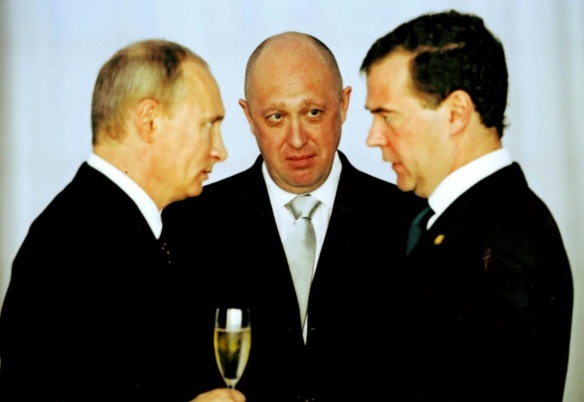
Prigozhin (center) reaches the top! He stands close to both Putin (left) and current Russian Federation Vice President Dmitry Medvedev (right) During confidential conversation. In 2012, Prigozhin was awarded a two-year contract to supply more than 90 percent of all food orders for Russian Federation soldiers. It all began when he opened several catering points in the properties of the Russian Federation Defense Ministry and Russian Federation General Staff. However, once the decision was made to privatize the military commissary in 2012, 90% of all orders in the sector went to the companies affiliated with Prigozhin. The total sum of the contract for 2013 to 2014 amounted to $999 million. Additionally, in 2014, companies affiliated with Prigozhin began servicing military towns by providing meals, cleaning, barracks maintenance, heating, and water supply. According to media outlet The Bell, from 2014 to 2019 the alleged volume of federal government orders on meal supplies to schools and hospitals, as well as services provided to the Defence Ministry, approximately amounted to $1.6 billion. It all went to Prigozhin’s companies. As discussed in Part 2, Putin would oddly lay out the tie between Concord and the Russian Federation Defense Ministry in an address following the Wagner Group Rebellion.
Following that, Prigozhin signed several federal government contracts totaling at least $3.1 billion. Prigozhin is linked to the oil industry as well. His companies reportedly received a percentage of Syria’s oil revenue in exchange for protecting its oil fields from the virulent Islamic terrorist organization, ISIS. A portion of the profits from his contracts with the Russian Federation Defense Ministry are alleged to have been used to start and fund the Internet Research Agency.
It has been suggested that Prigozhin was somewhat likely advised by government sources to use his funds in this manner. The Internet Resource Agency, known also as Glavset, is a St. Petersburg-based technological company seeking to promote disinformation campaigns both domestically and abroad. In its initial operations, Glavset sought to put down domestic protests by creating counterfeit social media accounts that advocated on behalf of Putin and disparaged the actions of his primary opponent, Aleksei Navalny. However, its operations expanded to the point of interfering with elections internationally, including those within the US in 2016. Alleged evidence of Prigozhin’s involvement in the US election meddling is his meeting with Mikhail Bystrov, the appointed head of Glavset, several times between 2015 and 2016 to discuss work being performed. Considered notable among those certain of Prigozhin’s role in the matter is the fact that Glavset’s “Project Lakhta”, known to be a disinformation campaign, received approximately $1.2 million in funding from Bystrov in 2016 alone. A grand jury in the US federal court system, used the term “troll farm” to describe the Internet Research Agency and determined that it was used to meddle in the 2016 US Presidential Elections. A reward of up to $250,000 has been offered by the US Federal Bureau of Investigation for information leading to the arrest of Prigozhin.
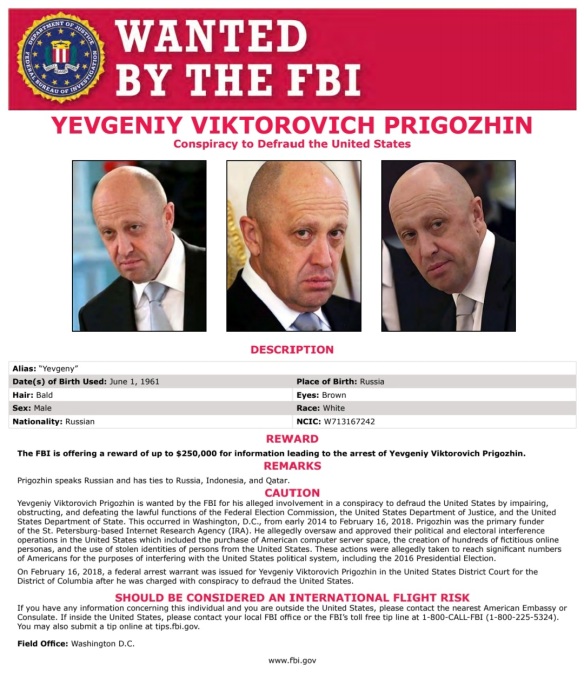
Three “cheerful” photos of Prigozhin (above) on a US Federal Bureau of Investigation “Wanted Poster”. Perhaps in the Russian underworld in which Prigozhin ostensibly has his hands somewhat dipped, the poster is a badge of honor, a sign that he had made it to the top! It has been suggested that Prigozhin was somewhat likely advised by government sources to use his funds in this manner. The Internet Resource Agency, known also as Glavset, is a St. Petersburg-based technological company seeking to promote disinformation campaigns both domestically and abroad. In its initial operations, Glavset sought to put down domestic protests by creating counterfeit social media accounts that advocated on behalf of Putin and disparaged the actions of his primary political opponent then, Aleksei Navalny. However, its operations expanded to the point of interfering with elections internationally, including those within the US in 2016A grand jury in the US federal court system, used the term “troll farm” to describe the Internet Research Agency and determined that it was used to meddle in the 2016 US Presidential Elections. A reward of up to $250,000 has been offered by the US Federal Bureau of Investigation for information leading to the arrest of Prigozhin.
Prigozhin and the Wagner Group
In 2014, Prigozhin invested a portion of his sizable wherewithal to develop a private military corporation, ChVK Vagnera, popularly known as Gruppa Vagnera (the Wagner Group). Although private military companies are not permitted under law in the Russian Federation, the organization and others were endorsed in April 2012 by Putin, then Russian Federation Prime Minister during an address to the State Duma. Headquartered in St.. Petersburg, the Wagner Group has engaged in actions externally in support of the Russian Federation’s overt and covert foreign and national security objectives. The Wagner Group is known to have deployed its units in the War in Donbas (2014–2022); Syrian Civil War, (2015–2016); the South Sudanese Civil War (2013-2020); the Central African Republic Civil War (2013-2014); the Second Libyan Civil War (2014-2020); the Sudanese Revolution (2018-2019); Venezuelan presidential crisis (2019-2023); and the Mali War (2012-present).
As explained in some detail in greatcharlie’s February 28, 2023 post entitled, “Commentary: The Utilization of Wagner Group Penal Units as Suicide Squads: A Callous Go-to Solution for Regimes Facing Intractable Military Situations”, from the time of the organization’s inception, it was widely believed that the organization was founded, owned and led by Dmitriy Utkin. Utkin is a veteran of the First and Second Chechen Wars. Until 2013, he served as lieutenant colonel and brigade commander of the 700th Independent Voyská spetsiálnogo naznachéniya (‘Special Purpose Military Detachment) of the 2nd Independent Brigade, a special forces unit of Glavnoe operativnoe upravlenie General’nogo štaba Vooružёnnyh sil Rossijskoj Federacii (the Main Operational Directorate of the General Staff of the Russian Federation) or GRU. However, in an August 2017, article in the Turkish newspaper Yeni Şafak, the suggestion was made that Utkin was only a figurehead for the company. Fingers pointed at Prigozhin as its true owner. Prigozhin went some distance to deny any ties to the Wagner Group. He even denied any communication with it. Prigozhin actually sued Bellingcat, Meduza, and Echo of Moscow for claiming he had links to the organization. In an interview in December 2018, Putin also denied allegations that Prigozhin had been directing the Wagner Group’s activities. However, in September 2022, Prigozhin relented and admitted to having created the group. Prigozhin claimed, “I cleaned the old weapons myself, sorted out the bulletproof vests myself and found specialists who could help me with this. From that moment, on May 1, 2014, a group of patriots was born, which later came to be called the Wagner Battalion.” As noted earlier, the Wagner Group was already operating in Ukraine,when the special military operation began. Wearing green uniforms without any unit patches or insignia, the received the name of “little green men” as they marched into Ukraine in 2014. In the Donbas, Wagner Group troops were directly engaged in the fighting. Prigozhin funded military bases there which greatly supported the Russian Federation’s efforts.
At the organization’s core, Wagner Group troops are predominantly retired regular Russian Federation Armed Forces servicemen–veterans. They are typically aged between 35 and 55. Many served in the Russian Federation’s spetsnaz units, which as noted earlier, are near and dear to Putin’s heart. However, the Wagner Group also employs an international group of fighters. There are three main fighting units of the organization. The Rusich unit is predominantly ethnic Russian with a complement of international fighters. There is a Serbian unit built upon complement of former members of the Serbian Volunteer Guard–also known as “Arkan’s Tigers”–created by the deceased 1990s ethno-religious nationalist Serbian paramilitary warlord Zeljko Raznatovic’s–also known as Arkan. A relatively new unit in the Wagner Group consists of citizens of Scandinavian countries, particularly from Norway. It participated in the firefights on the Bakhmut front. The unit is referred to as the “Níðhöggr“, sometimes also known as Nidhogg.
The delinquencies and deficiencies of the top commanders of the Russian Federation Armed Forces assured that their campaign in Ukraine would go sour almost immediately. They would either need to find a way to save themselves or hope against hope an ally might come to their rescue. Ready and able, the Wagner Group went into Ukraine in greater numbers, providing additional strength and combat power on the battlefield that the Russian Federation Armed Forces could not muster. It is well-known now that since July 2022, Prigozhin began recruiting inmates from Russian Federation prisons to increase the organization’s strength. However, it was not long before ratcheting up its work in Ukraine that everyone realized that the Wagner Group’s troops were caught in that same snare as their Russian Federation Armed Forces “comrades”. That could only have been expected as the same senior Russian Federation commanders that put their own troops in dire circumstances, controlled the placement and movements of Wagner Group troops.
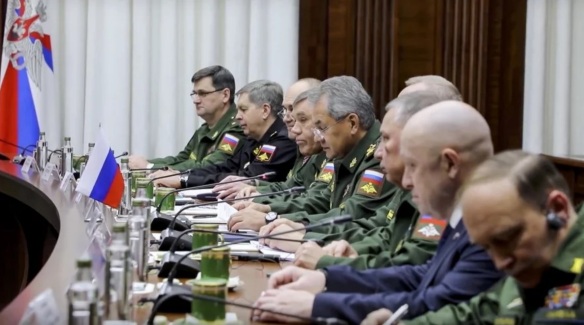
Prigozhin, in a dark blue suit (second from right) attends a meeting involving top Russian Federation Defense Ministry and Russian Federation General Staff and members of Libya’s National Army in Moscow on November 7, 2018. Headquartered in St. Petersburg, the Wagner Group has engaged in actions externally in support of the Russian Federation’s overt and covert foreign and national security objectives. The Wagner Group is known to have deployed its units in the War in Donbas (2014–2022); Syrian Civil War, (2015–2016); the South Sudanese Civil War (2013-2020); the Central African Republic Civil War (2013-2014); the Second Libyan Civil War (2014-2020); the Sudanese Revolution (2018-2019); Venezuelan presidential crisis (2019-2023); and the Mali War (2012-present). The Wagner Group was already operating in Ukraine,when the special military operation began. Wearing green uniforms without any unit patches or insignia, the received the name of “little green men” as they marched into Ukraine in 2014. In the Donbas, Wagner Group troops were directly engaged. Fighting. Prigozhin funded military bases there which greatly supported the Russian Federation’s efforts..
According to initial statistics available after April 2022 an estimated 10,000 and 20,000 mercenaries were deployed to Ukraine by the Russian Federation Armed Force, to include the Wagner Group troops in the offensive in the Donbas. As noted, to increase the organization’s strength even further, new Wagner Group units composed mainly with violent convicts from prisons–gangsters, murderers, and rapists, were formed. The recruitment of prison inmates for service in the Wagner Group is nothing new. The organization reportedly recruited imprisoned UPC rebels in the Central African Republic to fight in Mali and Ukraine. They are reportedly nicknamed the “Black Russians”. It was the Wagner Group “penal units” in particular that suffered high-profile casualties. Callous Russian Federation commanders threw them into battle pell mell. According to the US, out of an initial force of nearly 50,000 Wagner troops, including 40,000 recruited convicts, more than 4,100 have been killed in action, and 10,000 have been wounded, including over 1,000 killed between late November and early December 2022. In a February 17, 2023 briefing White House National Security Council (NSC) spokesman John Kirby told reporters that the Wagner Group has suffered more than 30,000 casualties since Russia’s invasion of Ukraine, with about 9,000 of those fighters killed in action. He further explained the US estimates that 90% of Wagner Group troops killed in Ukraine since December were convict recruits. Prigozhin began publicly expressing concern that his troops’ display of courage, obedience to authority and acts of sacrifice had been looked upon with indifference by Russian Army commanders. Given the backgrounds of the Wagner Group prison recruits, the common wisdom is that they are desensitized to violence. They are depicted as fighting as if they have nothing left to lose. From the lens of the Kremlin, things certainly did not work out the way they were supposed to.
It would later be revealed by the Wagner Group’s chief of staff, a senior commander known by the cognomen “Marx”, that 22,000 of the organization’s troops had been killed in action in Ukraine. In his statement, published by the Wagner Group’s Telegram channel, Marx further explained that another 40,000 were wounded in action. Of the 78,000 Wagner Group troops who served in what Marx referred to as “the Ukrainian business trip”, 49,000 of them were convicts. The Wagner Group has reportedly halted the practice of recruiting convicts in its ranks. Former convicts in the organization that survived service in Ukraine have been released from their contracts.
Prigozhin surely recognized early on that more than simply suffering under inept leadership of Russian Federation commanders, he and his organization were being pushed toward the precipice of losing everything by individuals seemingly more skilled in finding ways to defeat him than defeating their opponent on the battlefield. He certainly was not going to countenance that. An idea perhaps alien or incomprehensible to many readers is the possibility that Prigozhin was tolerant, at least up to a point, of the unpleasant set of circumstances under which he was caused to operate in an effort to demonstrate his loyalty and support for Putin. Homo antiqua virtute ac fide? (A man of the “ancient” virtue and loyalty?)
Particularly during the months-long battle for the Ukrainian coal-mining town of Bakhmut, senior managers and troops of the Wagner Group surely felt they were being thwarted, from keeping the Russian Federation in the fight, meeting their organization’s longstanding commitment to Putin and the Russian Federation, as well as meeting their personal and emotional promise to Putin not to leave Ukraine until the Russian Federation won the war. It is all very heavy stuff for a group of individuals whose top priority most would likely argue is profit. Based on his public comments, Prigozhin appears to believe victory is still possible under the right military leadership. It was during a crucial stage in the Bakhmut fight that Prigozhin expressed a desire to leave Ukraine not due to disloyalty or defeatism, but due to the attitudes and actions of the same Russian Federation Armed Forces senior commanders whose forces the Wagner Group jumped into Ukraine to support–or as Prigozhin would somewhat likely say, “to rescue.” Wagner Group units apparently were not receiving the military resources they needed to fight in a manner they preferred. (In meditating on Prigozhin’s position, Putin might want take into consideration the terrible outcome of the decision by Russian Federation commanders who were killing off their own conventional troops due a lack of so many necessary attributes for competent, military command on the present-day battlefield, to use his beloved spetsnaz units with their exquisite military capabilities to perform stealthy hit-and-run direct actions, special reconnaissance, counterterrorism, and covert operations, on the frontlines in conventional roles. the specialized units were over relied upon and consequently suffered devastating losses.)
Well known is the fact that Putin prefers to take as few people as possible into his confidence. Even with those lucky few he is doubtlessly frugal with his thoughts. Conceivably, Putin had spoken quietly with Prigozhin over the very public vocalization of his rage over the fundamental failures and gross mismanagement of the special military operation by the Russian Federation Defense Ministry and the Russian Federation General Staff since its start. Whatever may have been discussed in such a meeting it hardly concerned taking steps against Shoigu and Gerasimov that Prigozhin was insisting upon, but a solution of some kind may have been voiced by Putin that manifested his unique lens on matters. Note, Prigozhin has neither expressed dissatisfaction with Putin nor has he ever stated anything he believed deep in his heart was derogatory about him. He has always spoken of him in endearing terms. When originally coordinating the Wagner Group’s with Russian Federation Armed Forces, according to the Guardian, Prigozhin would refer to Putin in those meetings as “Papa” which served to reflect his closeness to him as well as his fealty. It is unclear how the Guardian came by this picture of Prigozhin’s meetings within the Russian Federation Defense Ministry. Prigozhin would unlikely have wished to foment dissent against “Papa,” his dear leader. That would never have been Prigozhin’s intention, nor will it ever be. This is stated by greatcharlie with the most recent events most firmly in mind.

Prigozhin in Bakhmut (above). The delinquencies and deficiencies of the top commanders of the Russian Federation Armed Forces assured that their campaign in Ukraine would go sour almost immediately. They would either need to find a way to save themselves or hope against hope an ally might come to their rescue. Ready and able, the Wagner Group went into Ukraine in greater numbers, providing additional strength and combat power on the battlefield that the Russian Federation Armed Forces could not muster. It is well-known now that since July 2022, Prigozhin began recruiting inmates from Russian Federation prisons to increase the organization’s strength. However, it was not long before ratcheting up its work in Ukraine that everyone realized that the Wagner Group’s troops were caught in that same snare as their Russian Federation Armed Forces “comrades”. That could only have been expected as the same senior Russian Federation commanders that put their own troops in dire circumstances, controlled the placement and movements of Wagner Group troops.
Reality Check
Non mihi si linguæ centum sint oraque centum, ferrea vox, omnes scelerum comprendere formas omnia pœnarum percurrere nomina possim. (Not if I had a hundred tongues, a hundred mouths, and a voice of iron, could I repeat all the types of wickedness, and run over all the names of penal woes.) The supercharged modality of Prigozhin’s expressions concerning the performance of Shoigu and Gerasimov was by no means been within normal parameters and such reproach and obloquy from anyone toward those immensely powerful government leaders and organizations would never have been expected before the special military operation began. In the Russian Federation, “discrediting the armed forces” carries a maximum 15-year prison sentence. Many of Prigozhin’s public statements about the situation in Ukraine are now famous worldwide.
Some in the mainstream Western newsmedia would lead their audience to believe Prigozhin’s regular public ravings about how the war was being managed was an indication that he may have an unhealthy mind. Res ipsa loquitur! Bizarre reports of Prigozhin providing information on the positions of the Russian Army in Bakhmut appear equally faulty. They have only evinced a misunderstanding of Prigozhin’s relationship to Putin and what the very active private military contractor means to the Russian Federation President personally. From the moment any claim was made of Prigozhin’s betrayal, at least on the Russian Federation side, it was doubtlessly viewed as a comical yet nonetheless apocryphal rumor ginned up by his opponents. To that extent, it was surely rejected as fast as inane suggestions meant to bias the mind back in March 2022 that the extraordinarily violent and most loyal Putin subordinate, the chief of the Federal’naya Sluzhba Bezopasnosti Rossiyskoy Federatsi (Russian Federation Federal Security Service) or FSB, Alexander Bortnikov, would possibly overthrow his president and take over the government and on a matter outside of the Ukraine War context, the very patriotic and extremely dangerous People’s Republic of China Vice Minister for counterintelligence of the Ministry of State Security, Dong Jingwei, had of all things defected to the US in June 2022. (The Dong Jingwei defection matter is treated in some detail in greatcharlie’s June 30, 2021 post entitled “The Defection That Never Was: Meditations on the Dong Jingwei Defection Hoax”.) These suggests were not clever, but rather crass. One could get the impression that those responsible for the US political warfare effort against the Russian Federation have been soliciting ideas from a group of local junior high school boys for the most immature suggestions possible. Surely, that would count as a bold attempt to exploit thinking from outside the US foreign and national security policy bureaucracies. Conscia mens recti famæ mendacia risit. (The mind conscious of integrity scorns the lies of rumor.)
Speaking plainly as he does, Prigozhin’s vocal expressions might at best send a clear signal to Wagner Group troops that they genuinely matter to him, but alone, his words do not appear to have accomplished too much. Prigozhin clearly recognized that as long as his organization’s troops remain in Ukraine, they will be “at the mercy” of what he clearly deems to be careless and inept top officials of the Russian Defense Ministry and top commanders of the Russian Federation Armed Forces General Staff. That does not bode well for them. If one might toss on top of everything Prigozhin’s contentious relationship with those officials and commanders, it becomes nearly impossible to foresee anything positive coming the way of those troops in the future. Such will likely remain a constant no matter how things fall, one way or another in the midst of Moscow’s Ukraine enterprise. Memores acti prudentes futuri. (Mindful of what has been done, aware of what will be.)
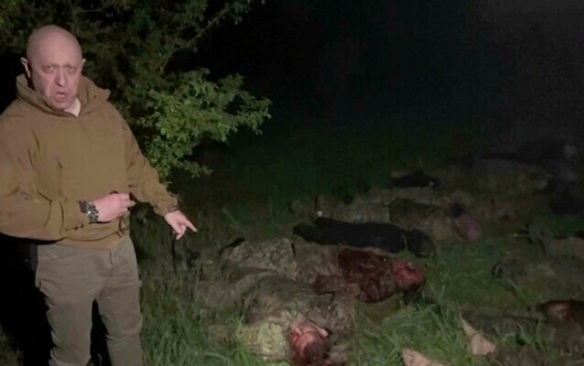
Prigozhin standing before rows of Wagner Group troops killed in action in Ukraine. According to the US, out of an initial force of nearly 50,000 Wagner troops, including 40,000 recruited convicts, more than 4,100 have been killed in action, and 10,000 have been wounded, including over 1,000 killed between late November and early December 2022. In a February 17, 2023 briefing at the White House, US National Security Council spokesman John Kirby told reporters that the Wagner Group has suffered more than 30,000 casualties since Russia’s invasion of Ukraine, with about 9,000 of those fighters killed in action. He further explained the US estimates that 90% of Wagner Group troops killed in Ukraine since December were convict recruits. Prigozhin began publicly expressing concern that his troops’ display of courage, obedience to authority and acts of sacrifice had been looked upon with indifference by Russian Army commanders.
The limited capabilities of Prigozhin’s organization as a military force also adds to his woes. Indeed, the Wagner Group is a one dimensional force: infantry with some potential to conduct special operations given the specialized military training and experience of many of its troops. As with everything else in which they were delinquent or deficient, the leadership of the Russian Federation Armed Forces moved to utilize the Wagner Group as part of their combat operations during the special military operation doubtlessly with preconceptions in their minds via existing intelligence reporting on how the Ukrainians were situated to fight. To name a few of the deficiencies likely imagined in Moscow, it was surely thought to be short of weapons, short of good leadership, and short of well-trained troops. Through international newsmedia reporting, the whole world was led to believe the same. (Irony of ironies, it was the Russian Federation Armed Forces that actually had shortages of everything, including gear, troops, and especially military acumen.) The Wagner Group, loaded with veteran fighters, was expected to have a multiplier effect on the frontline. They made the questionable choice to utilize their own spetsnaz units in the same way.
Carelessly unforeseen and unimagined by the Russian Federation Defense Ministry and the Russian Federation General Staff was the massive level of assistance that the Ukrainians would eventually receive from the Western powers and other countries. (That matter is examined in some detail in greatcharlie’s November 30, 2022 post entitled “Ruminations on the Russian Federation’s Failure To Close the Door in Western Ukraine to Foreign Military Assistance as Part of Its Invasion Plan”.) That assistance has made the Zbrojni syly Ukrayiny (Ukrainian Armed Forces), even with its few remaining deficiencies, one of the more formidable military powers in Europe. Far more than just javelin and stinger shoulder fired weapons, small arms, and uniforms, the long list of assistance has included high-tech armaments as Patriot air defense systems and NASAMS (Norwegian (or National) Advanced Surface-to-Air Missile System) air defense systems, MLRS systems HIMARS systems, mobile and precision long-range artillery, anti-ship rockets, Abrams, Leopard, and Challenger tanks, MiG-29s, F-16s, helicopters, a variety drones, real-time intelligence, and loads of troop training. The Wagner Group could hardly have had a multiplier effect as the one dimensional force that it has been on a battlefield in which its opposition possessed such weapons and capabilities.
For situations in which the Wagner Group would be asked to assist in Ukraine, at a minimum its units would have been far better off possessing far greater organic fire support for targets its commanders would independently select to support rapid maneuver beyond the front into the opponent’s rear, cutting lines of communication and destroying or disrupting the opponent’s desperately needed combat support and combat service support. A robust organic technical means to increase survivability of its assets would also have been helpful. Rapid transport assets to support a shoot and scoot capability for its firepower assets would also have been required for maneuver as well as ensure survivability. Rolling around in refurbished, dilapidated Russian Army trucks was not enough. Additionally, a robust, organic drone capability would be needed particularly for ISR, direct action, and psychological warfare operations to support the more effective planning and execution of missions. Given how the war in Ukraine has progressed, the new ways in which existing technologies are used and new ones are developed and introduced, new efficiencies in warfighting may render these few suggestions outdated. Still, the crux of what is presented here should be readily apparent. (Even the White Russian anti-Putin, pro-Ukrainian insurgent groups–the Freedom For Russia Legion and the Russian Volunteer Corps used rather pricey Western-made military vehicles to launch their May 2023 raid into Belgorod region of Russian Federation. The vehicles were reportedly supplied by an unknown source. Images appeared on social media allegedly displaying those vehicles. Reporting on the equipment it observed, the Oryx open-source weapons tracking group, stated that the Russian Federation forces captured two International M1224 MaxxPro MRAPs, two 2 M1151 HMMWVs-, and one M1152 HMMWV that was damaged.)
As for procurement, the Wagner Group might have effectively sought out Independent sources of military resources for the company not with regard to its service in Ukraine but more generally to supply itself as a fully autonomous, fully operational professional military contractor. It would be one more step in attenuating its reliance upon the largess of the fickle Russian Federation Defense Ministry and the Russian Federation Armed Forces. All of that being stated, interoperability of armaments procured with those in the Russian Federation inventory would likely be viewed as a requirement by Prigozhin, keeping in mind the possibility of needing to operate in cooperation with the country’s armed forces, especially if asked to do so by Putin. Without variance, any procurement efforts should only be made with a keen eye on working within the parameters of existing international sanctions concerning armaments and the Russian Federation. It would be useful for the Wagner Group to have its own supply of food, water, medical facilities, and petroleum and oil lubricants. As long as these relative inadequacies as well as others persisted, the Wagner Group as noted, would remain poorly situated to optimally serve in support of Russian Federation military operations in Ukraine. As long as they exist, Prigozhin’s demands for greater autonomy will remain something less than legitimate. No statements have been made or actions taken concerning the structure, strength, composition, or rearming of the organization that would indicate the situation would change anytime soon.
It is very possible–actually more likely–that Prigozhin may not have had any interest at all in making great changes to how his organization’s units were structured. To that extent, Prigozhin may have long ago accepted that there would be a strategy-resources mismatch that would prevent the Wagner Group from playing a greater and genuinely effective role in support of Russian Federation military objectives in Ukraine even if it had been given a feerer hand. Given the few actualities presented here and others, one option that evidence suggests clearly arose in the mind of Prigozhin was to mostly withdraw his organization from the field in Ukraine, while keeping a portion available in-country to serve as effectively as possible structured as it is. In that way, Prigozhin could then continue to put the Wagner Group to use elsewhere worldwide where it could serve more effectively and more successfully. Again, that is what Prigozhin appeared to have been doing or at least seemed to be what he wanted to do before the Wagner Group Rebellion “erupted.” (It is not possible for greatcharlie to confirm any of Prigozhin’s burgeoning actions were founded on reasons similar to those expressed here.)

Prigozhin assists his Wagner Group troops load up in trucks moving up to the front in Ukraine. The limited capabilities of his organization as a military force added to his woes. Indeed, the Wagner Group is a one dimensional force: infantry with some potential to conduct special operations given the specialized military training and experience of many of its troops. They possessed diminutive armor, mechanized, and firepower resources. For situations in which the Wagner Group would be asked to assist in Ukraine, at a minimum its units would have been far better off possessing far greater organic fire support for targets its commanders would independently select to support rapid maneuver beyond the front into the opponent’s rear, cutting lines of communication and destroying or disrupting the opponent’s desperately needed combat support and combat service support. A robust organic technical means to increase survivability of its assets would also have been helpful. Rapid transport assets to support a shoot and scoot capability for its firepower assets would also have been required for maneuver as well as ensure survivability. Rolling around in refurbished, dilapidated, second-hand, Russian Army trucks was not enough.
A Few Oscillating Ruminations on Prigozhin
Serum est cavendi tempus in mediis malis. (The time for caution is too late when we are in the midst of evils.) It might have been plausible enough for many experts and observers to believe it would have been in the best interest of Prigozhin to do the heavy lifting politically to ensure that he and his unit commanders will play a greater role in decisionmaking on how Wagner Group capabilities will be integrated into the future planning of cooperative operations with the Russian Federation Armed Forces in Ukraine. That might have included insisting that the Wagner Group would always have a say on where they would be deployed, missions it would accept, and how they would perform them. In that vein, Prigozhin ostensibly could have made a genuine go at using his considerable political influence with Putin, speak truth to power and so on, and implore him to provide the Wagner Group with a greater say in how it will execute missions in support of Russian Federation Armed Forces. Yet, such a political move would have been tricky or if not a grave blunder. Prigozhin is savvy enough to know that if he forced Putin to choose between Shoigu and himself, he would very well have lost. True, despite the nature of professional relations between Putin and Prigozhin concerning the Wagner Group and military affairs, more important was their personal relationship. That relationship, recall, was at the crux and the apex of Prigozhin’s standing in the regime and in military circles as well as his sense of entitlement to issue criticism of the top military leadership of the Russian Federation and foist his cconvictionsupon everyone on how his organization could best be used in Ukraine.
Putin has shown considerable regard for Prigozhin bbutfor quite some time he has shown even greater regard for Shoigu professionally and personally (privately). Putin at one time would make regular recreational visits to Shoigu’s place of birth, the mystical land of Tuva. He would often invite foreign guests to come along. Putin’s conversations with Shoigu have always been a bit different than those with others. Putin needs a close confidant with a firm grip on the reigns of all matters of or pertaining to defense. In fact, for him, it is a priority. Shoigu is responsible for the management not only of the Russian Federation’s conventional forces but also its all important strategic nuclear triad and all of its supporting military elements. Militarily, a sine qua non for Putin is to possess without doubt, to believe with comfort, that the Russian Federation has the capability to successfully attack and destroy the US and its interests with nuclear weapons.
Omnia sunt hominum tenui pendentia filo; et subito casu, quæ valuere, ruunt. (All things human hang by a slender thread; and that which seemed to stand strong all of a sudden falls and sinks in ruins.) Competition for Putin’s attention surely comes in from all directions, and it is likely greater now than ever. He and his staff seem to be able to handle that. Prigozhin was surely well-aware that Putin really did not need at any point, for any reason, and especially during the flailing special military operation would have been an extra problem that from one angle might simply boil down to him as mere in-house bickering between two “closely ranked” associates. As noted in greatcharlie’s preceding June 1, 2023 post entitled, “Commentary: Will the Ukraine War’s Course Stir Putin to Alter His Thinking and Seek Novel Ways Either to Win or to Reach a Peace Deal?”, Prigozhin is conceivably someone well-able to discern how much pressure is being brought to bear on Putin, and see great risk in overburdening him on anything that is not quite an emergency. After all, in the Wagner Group, he has long-demonstrated that effectively dealing with, managing, and understanding strong-spirited and strong-willed men is his forte. A leader must be strong, but also. at the right time, compassionate.
If one might see some plausibility in greatcharlie’s discussion along this line about Prigozhin, one might be been able to accept or at least consider that on his own volition, he very unlikely would have pushed the matter of his struggle with Shoigu and Gerasimov to the point where his forces amassed for days in plain view on the border between Ukraine and the Russian Federation–even the US had then under surveillance by satellite–would after a very public announcement of rebellion, begin a military drive toward their offices. True, that is exactly how things appeared to have happened to many. Still, it was unlikely the case.
To gnaw a bit further on this point, there can be little doubt in greatcharlie’s mind that Prigozhin has greatly concern himself with what Putin has been facing in these very trying times for the Russian Federation following his decision to intervene in Ukraine. What Putin thinks is of the utmost importance to Prigozhin. For loyal subordinates such as Prigozhin, Putin is the priority. Discussing Prigozhin during an interview, political activist Aleksei Navalny stated: “[Prigozhin] didn’t invent anything, didn’t find buried treasure, didn’t win at the Olympics. He received his prize as thanks for serving the president well.” In the old-fashioned, out-moded sense, Prigozhin is under obligation to Putin. Yet, as a knock on to all of this, greatcharlie will go out on a limb and state that it is very hard to believe that Prigozhin, regardless of any likely sense of obligation, would ever act in a way to bring a shadow upon Putin’s life.
The Platters was one of the most successful vocal groups of the early rock and roll era. Their distinctive sound was a bridge between the pre-rock Tin Pan Alley tradition and the growing new genre. “Only You (And You Alone)” (often shortened to “Only You”) is a pop song composed by Buck Ram. It was originally recorded by The Platters in 1955. In the first verse of this song about true devotion and love which seem to greatcharlie to be befitting Prigozhin’s “frame of mind” on Putin are the words: “Only you can make all this world seem right / Only you can make the darkness bright / Only you and you alone can thrill me like you do / And fill my heart with love for only you.”
It is a wonder why Prigozhin, himself, has not gone absolutely mad given the extraordinary pressures that have relentlessly squeezed him once the Wagner Group became heavily engaged in the special military operation. Outwardly, Prigozhin is a strong man, with a hardened exterior, who leaves no doubt as to where he stands among other men. Photos of him on the frontlines in Ukraine well-depict that. There is an apparent dichotomy to his persona. It is most apparent with regard to his main business ventures. On the one hand, as aforementioned, he owns a hugely successful catering business and he is a restaurateur. That culinary work more or less has required Prigozhin to display a creative hand with a mind ensuring those who dine on his food receive nourishment of life and a beautiful dining experience. On the other hand, as a private military contractor his work has entailed destroying people and property.
One might hazard to suggest that it is Prigozhin’s nourishing side which seeks to sustain his relationship with Putin and give him the support he needs to fortify his regime’s interests abroad. It is the destructive side of Prigozhin that Putin has exploited to achieve the ends of his expressed and secretive foreign and national security policies. Expectedly, some observers might dare say that Prigozhin’s desire to undertake such a morbid venture is part and parcel of some severe pathology. (Of course, similar private military contractors “could hardly thrive” in the socially and technologically advanced industrialized countries of the West.)
Perhaps somewhere at the confluence of the two modes of thinking deep within, there is a conflict. He has stood casually among piles of Wagner Group troops he recruited, many from Russian Federation prisons, piled in bags in storage rooms and laid out in fields. He openly admitted to the loss of 40,000 of those who joined his organization. The potency of it all is readily apparent. Prigozhin is still only human. There must be moments when he wonders what it is all amounting to. The US author Megan Devine provides words that may be apposite in this context in her bestseller, It’s OK That You’re Not OK: Meeting Grief and Loss in a Culture That Doesn’t Understand (Sounds True, 2017): “There are losses that rearrange the world. Deaths that change the way you see everything, grief that tears everything down. Pain that transports you to an entirely different universe, even while everyone else thinks nothing has really changed.”
There are those who would suggest Prigozhin has become bitter and disillusioned about the world around him, the Putin regime; essentially he is feeling jaded. Of course, it was the largesse of Putin’s regime that over the years allowed him to become a billionaire. On a more specific level, it might be posited that Prigozhin has become jaded with regard to the Ukraine War. There may very well be scope to that idea. He has talked of moving on with his Wagner Group to better things. To that extent there may also be some materiality. It would be questionable to characterize Prigozhin as a cynic who is endlessly expressing his underlying distrust of everything. Yet, far from believing the Russian Federation’s situation in Ukraine cannot become better, Prigozhin appears determined to right wrongs by those he feels have failed Putin and the Russian Federation and snatch victory from the jaws of defeat somehow.
In greatcharlie’s January 31, 2023 post entitled, “Reflections on the Battle of the Crater in Relation to Russian Federation Casualties in Ukraine: Where Did All the Leaders Go?”, it was noted that there have been no reported incidents of members of different Russian Federation units murdering each other on the battlefield. However, it went on further to state: “It would seem joining Wagner Group troops with Russian Army troops would create an elevated risk for a blue-on-blue attacks, as Russian Federation Armed Forces commanders may be willing to do anything to thwart Wagner Group troops from showing-up their own.”

It is a wonder why Prigozhin, himself, has not gone absolutely mad given the extraordinary pressures that have relentlessly squeezed him once the Wagner Group became heavily engaged in the special military operation. Outwardly, Prigozhin is a strong man, with a hardened exterior, who leaves no doubt as to where he stands among other men. Photos of him on the frontlines in Ukraine well-depict that. There is an apparent dichotomy to his persona. It is most apparent with regard to his main business ventures. On the one hand, as aforementioned, he owns a hugely successful catering business and he is a restauranteur. That culinary work more or less has required Prigozhin to display a creative hand with a mind ensuring those who dine on his food receive nourishment of life and a beautiful dining experience. On the other hand, as a private military contractor his work has entailed destroying people and property.
According to Ukrainian Armed Forces in April 2023, a shoot-out allegedly erupted in the settlement of Stanytsia Luhanska (Luhansk Oblast) between Russian Army soldiers and Wagner Group troops concerning which side is to blame for Russia’s failures amid the invasion of Ukraine. Those reports were not substantiated by Kyiv or confirmed by any sources in Moscow. On June 2, 2023, Prigozhin, writing on Telegram, alleged his troops had discovered 12 locations in rear areas where Russian Federation Defense Ministry officials had planted various explosive devices, including hundreds of anti-tank mines. He further reported that when he inquired with Defense Ministry officials as to why the charges had been set, they explained it was an order from their superiors. Prigozhin stated: “It was not necessary to plant these charges in order to deter the enemy, as it [the area in question] is in the rear area. Therefore, we can assume that these charges were intended to meet the advancing units of Wagner.” Prigozhin noted that none of the charges went off and no one was hurt. Still, he added: “We assume this was an attempt at a public flogging.”
The long absence of some firm public comment from Putin on the feud is deafening and profound. If Putin and Prigozhin have not as yet had an in-depth conversation about these issues, it is very likely that the Russian Federation President nevertheless has been giving his attention to the matter “covertly”–with all that imaginably would entail–for some time. Perchance Putin’s refusal or delay to take swift and decisive action on the discordance between Prigozhin and the duo, Shoigu and Gerasimov–despite how relatively noisy Prigozhin became and how aggressively Shoigu and Gerasimov behaved–seemed to provide evidence of the emergence of some new aspect of his character: Putin, the long-suffering?
If Putin had suddenly spoken out on the matter before the rebellion and in Solomonesque fashion, directed Prigozhin, Shoigu, and Gerasimov to work out an amicable plan to resolve their differences on the sustentation and upkeep of the Wagner Group and present their results to him, the respective loyalty and obedience of all three would have been put to the test. Shoigu and Gerasimov pretty much control the whole show which is essentially the problem to which Prigozhin has been calling attention. Under such a scenario, they would unlikely have been willing to brook any serious discussion of making the Wagner Group a stronger and far greater force. Prigozhin would most likely have remained flawlessly obedient to Putin’s orders to hash it out but deep down would hardly have been interested in putting too much time into butting heads with the leadership of the Russian Federation Defense Ministry and the Russian Federation General Staff. Prigozhin would probably see in advance that the most trying part of such a “confrontation” would be not be contending with the disdain of Shoigu and Gerasimov toward him, but their obsolescent preconceptions of military affairs and military science in general, which he might foresee would doubtlessly have caused them to filter his new ideas for the role of his organization through their archaic and prosaic ones. (It is possible that Shoigu and Gerasimov also had viewed the relationship of the Wagner Group to their organization’s as parasitical. Their actions concerning the combat support and combat service support of Wagner give force to that idea.) The only concession Prigozhin might have made under such circumstances would be to agree to keep his Wagner Group troops in Ukraine for the duration of the conflict and maintain its presence in-country at a certain strength. Shoigu and Gerasimov would have needed to make many concessions to satisfy Prigozhin based on past behavior. Still, even if some allegedly practical plans might be worked out and presented to Putin, in this hypothetical, what would be presented might better reflect what is possible than what will be. Nous sommes reconnaissant de votre considération et croyons que vous aurez du plaisir à être partenaire avec nous. Only the emergence of some exigent circumstance could have had the effect of shifting more power to one side or another on the “control” issue. Not to get too far ahead, but it would seem the Wagner Group Rebellion provided just such an emergency.

Russian President Vladimir Putin during the Supreme Economic Eurasian Council at the Grand Kremlin Palace in Moscow, May 25, 2023. The long absence of some firm public comment from Putin on the feud is deafening and profound. If Putin and Prigozhin have not as yet had an in-depth conversation about these issues, it is very likely that the Russian Federation President nevertheless has been giving his attention to the matter “covertly”–with all that imaginably would entail–for some time. Perchance Putin’s refusal or delay to take swift and decisive action on the discordance between Prigozhin and the duo, Shoigu and Gerasimov–despite how relatively noisy Prigozhin became and how aggressively Shoigu and Gerasimov behaved–seemed to provide evidence of the emergence of some new aspect of his character: Putin, the long-suffering? Perhaps something deeper was going in his remarkable mind.
Fun and Games, Quicks and Aberrations
As alluded to earlier, Prigozhin’s wailing has not solely been out of concern for his troops and troops in the Russian Federation Armed Forces. One might speculate that Prigozhin has been vocalizing a sense of disappointment quietly and sometimes not so quietly felt among many other elites and members of Putin’s inner circle at how remarkably bad the Russian Federation Defense Ministry and the Russian Federation General Staff have served their President and their country. In effect, he may have taken on the job of being a figurative release valve for pent up steam building within many significant individuals in his country. If taking on that sort of role was not part of some plan, it appears to be how things have turned out.
Prigozhin’s shocking talk of a possible revolution expressed in early June 2023 were more than likely than not intended scare stories aimed at rattling many elites of the Russian Federation who find him to be anathema and not a forewarning of things to come. Perhaps making such nettlesome utterances helps to pass the time for those at the top of the food chain in Moscow. Prigozhin, himself, has made his thoughts on a mutual dislike between him and Russian elites living in the luxurious Moscow suburb of Rublyovka very public. Laughing off aforementioned reports that he had offered to reveal Russian troop positions to Ukrainian military intelligence in exchange for Kyiv’s withdrawal from Bakhmut. Prigozhin stated in an audio message posted on Telegram: “People from Rublyovka” could be behind the allegations.” He went on to state in his unique style: “Of course they will pour as much s*** on me as they can.” La leçon d’elegance de Yevgeny Prigozhin.
If Prigozhin’s original comments concerning a possible revolution in the Russian Federation actually was a manifestation of his brand of acidulous humor directed at antagonizing political and business elite at home, surely they were not appreciated among leaders of the FSB, especially since they came just before raids were launched along the Russian Federation’s borders by anti-Putin, pro-Ukrainian, ethnic-Russian groups. The eyes of FSB officials should have become strained after watching Prigozhin’s every more at that point. Given their reaction to events concerning the Wagner Group later in June, they would seem to have thrown little more than a few stray glances his way.
Intriguingly, the ultranationalist political figure Igor Girkin has alleged via a string of videos that Prigozhin’s public pronouncements concerning the military campaign in Ukraine as merely “a project” created by an influential group within Putin’s inner circle. Girkin, known among associates by the cognomen “Strelkov” (Shooter) is an anti-semite, and is likely unstable. He is a former officer in Glavnoye Razvedyvatel’noye Upravleniye Generalnovo Shtaba (Main Intelligence Directorate of the General Staff-Military Intelligence) or GRU. Girkin gained notice as an operative behind the Russian Federation’s 2014 invasion of Crimea. In the aftermath of the invasion, he became a prominent player in the effort to establish Nova Rossiya (New Russia) on the sovereign territory of Ukraine stretching from Kharkiv to Odessa. Girkin insists Prigozhin efforts are backed by Sergey Kiriyenko, Deputy Chief of Staff of the President of the Russian Federation, who Putin has appointed to oversee the occupied Ukrainian lands. Girkin has been quoted as saying: “Kiriyenko is openly at war with Shoigu, which is why Prigozhin attacks the Defense Ministry.” To that extent, Girkin claims Prigozhin is “not just a man whose eyes were suddenly opened and began speaking the truth.”
Girkin asserts further that “Kiriyenko is backed by the Kovalchuk brothers, people who are part of the President’s inner circle.” Yury Kovalchuk is the chairman and the largest shareholder of Rossiya Bank. According to the Ukrainian newspaper Zerkalo Nedeli (Mirror Weekly), together with his brother Mikhail Kovalchuk, as well as Mikhail Mishustin, chairman of the government of the Russian Federation, Andriy Turchak, the Secretary of the General Council of United Russia–Putin’s political party, Prigozhin, and others, he formed the influential Kovalchuk-Kiriyenko group.
It is important to note that Girkin emphasizes that Prigozhin is “not Russian by nationality,” more than insinuating that just as the “majority of Bolsheviks,” he is of Jewish origin and thereby poses a considerable threat to Russia. Ultimately, Girkin and all others similar to him–and there are many similar to him in the Russian Federation–are political figures that Putin must manage, not Prigozhin. Girkin, clearly a creature of the worst kind from the Russian Federation’s Intelligence Community, appears vindictive, passionate, ill-balanced, jealous, envious. The intelligence services of many countries–especially those in the US–have their fair share of Girkins. The utmost should be done to guard against them. That is not always the case: disco inferno!
Interestingly, so intense and focused had been the internecine quarreling between elites in Moscow that rarely heard publicly from them at the time was that old chestnut that the invisible hand of the US and its Western alter egos is behind all that has gone wrong for the Russian Federation and that is all part of a long-term plan destroy their country.
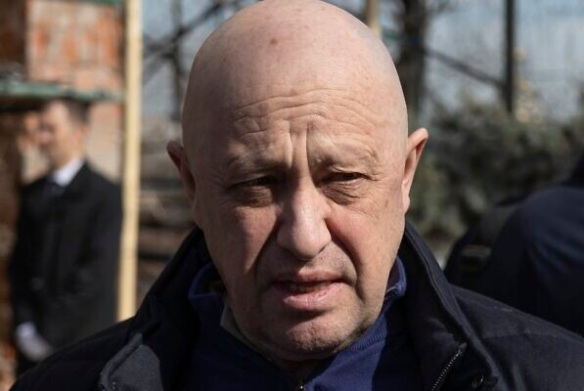
Prigozhin speaking on his media service channel on Telegram. One might speculate that Prigozhin has been vocalizing a sense of disappointment quietly and sometimes not so quietly felt among many other elites and members of Putin’s inner circle at how remarkably bad the Russian Federation Defense Ministry and the Russian Federation General Staff have served their President and their country. In effect, he may have taken on the job of being a figurative release valve for pent up steam building within many significant individuals in his country. If taking on that sort of role was not part of some plan, it appears to be how things have turned out.
Discussion will be extended in Part 2, to be published later.

